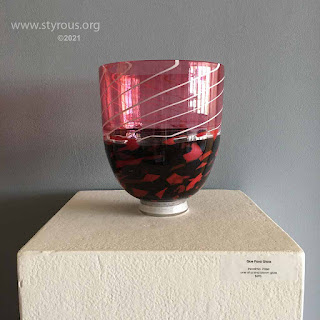Sick
and tired of the haste and hyper-mediation of the present
Anthropocene
era? (The geologic term for the epoch that began when human activities
started to have a significant, global, impact of the Earthʼs
ecosystems.) Try on the
post-apocalyptic future! The two-part
installation called, “The Ecotopian Archive”, documented here, provides a
portal to 2084 to witness the results of the Great Earth Cataclysm of
2077.
The Ecotopian Archive, by
Celeste Connor, is a portable, expanding, installation-in-process in the
Temescal District of
Oakland, California at the heart of
Oakland Art Murmur. Along with its outdoor Eastern section in
Walnut Creek on the border of The Open Space Regional Parkland (
links to both archives above and at the end), the visual work uses
Ernest Callenbach's 1975 novel, “
Ecotopia”,
as its libretto. Themes of
feminist statehood and collective quests for
a sustainable future are appropriated from the prescient novel by
Callenbach, an early Earth advocate and founding editor of Berkeley Film
Review.
Artists often look to the past for inspiration.
The current popularity of thrift stores, collecting of memorabilia, the
intrigue of sidewalk shopping, and even the revival of
scrapbooking
(as well as the increasing number of museums and memorials being built)
attest to our culture's obsession with "memory". Not the
Proustian kind; but the communal variety.
But
what about a memory of the future? In recent years visual artists have
created archives and collections as part of their creative practice.
What kinds of stories are being preserved? Which stories are being
omitted? An archive can be a powerful force of subversion; a portal
between an unfinished past and a reopened future.
Philosophical notions of transformed futures
have a long, venerable history in the West. Early schemes were memorably
drafted by
communitarian thinker
Saint Thomas Moore, artist and designer
William Morris, socialist-
sufferagist Charlotte Perkins Gilman;
later ones were crafted by artist members of
liberationist movements of
the 1970's. The alternative future is the pivot around which Connorʼs
3-D collection of toss-away Things gyrate.
Connorʼs
work, at heart--like that of her historical predecessors--is an act of
social criticism. And, like Callenbachʼs, it is directed pointedly at
Americaʼs role in instigating and exporting wasteful and unsustainable
ways of living. What distinguishes Connorʼs critique is its intense
visuality and vital materiality, its humor and optimism. What The
Ecotopian Archive adds to the vocabulary of
The Just Society is a quite
literal experience of the
archeological remains of one.
The premise of the Archive
The
3-D, assemblage, “Ecotopian Archive,” embodies evidence of a
woman-led nation, an evolved and sustainable state called Ecotopia, that
seceded from the United States in 1980 when
Reagan was elected
President. Now, in the
Gregorian Calendar year 2084, Earth has outlasted the
devastating, global cataclysm of 2077. That small portion of planet
Earth formerly known as “America” (and most of its living habitats) were
vaporized by ceaseless firestorms, volcanic flows, and eruptions of
hyper-geysers. Ecotopians survived; but most migrated off-planet.
Connor’s comic,
post-apocalyptic visual work includes rare Ecotopian video
recordings, diverse
archeological finds collected by those Ecotopians
who volunteered to remain behind to tend Earth’s recuperation for the
return of their Neotopian descendents. The Archive they assemble is a
unique collection of trans-categorizable Things (Dings) gleaned from the
detritus of the U.S and pre-cataclysm Ecotopian societies. Visitors are
welcomed to examine the evidence with care and draw their own
conclusions.
Celeste Connor email:
rrosaseconda@gmail.com
The Book
Link to the Ecotopian Archive/East: Exteriors
(located in Walnut Creek on the border of The Open Space Regional Park)
Link to the Ecotopian Archive/West: Interiors
(located in Temescal District of Oakland, CA)
video of the President of the State of Ecotopia, welcoming her post-cataclysmic citizens back to Earth on Vimeo
The Archive is open to the public by appointment only.
for info: rrosaseconda@gmail.com








